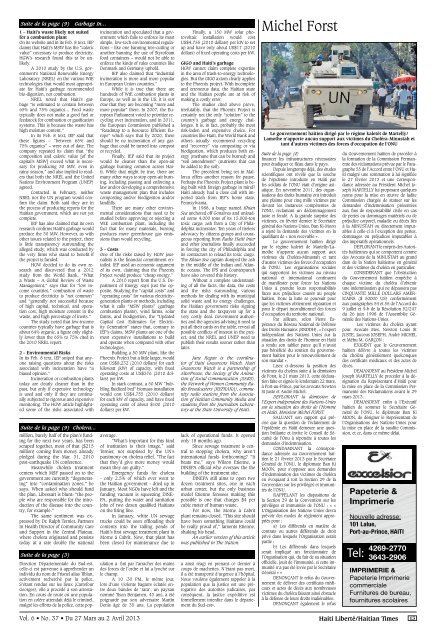les prochaines élections: a quel prix? - Haiti Liberte
les prochaines élections: a quel prix? - Haiti Liberte
les prochaines élections: a quel prix? - Haiti Liberte
Create successful ePaper yourself
Turn your PDF publications into a flip-book with our unique Google optimized e-Paper software.
Suite de la page (9) Garbage In…<br />
1 – <strong>Haiti</strong>’s waste likely not suited<br />
for a combustion plant<br />
On its website and in its Feb. 8 text, IEP<br />
claims that <strong>Haiti</strong>’s MSW has the “caloric<br />
value” necessary to produce electricity.<br />
HGW’s research found this to be unlikely.<br />
A 2010 study by the U.S. government’s<br />
National Renewable Energy<br />
Laboratory (NREL) on the various WtE<br />
technologies that would most appropriate<br />
for <strong>Haiti</strong>’s garbage recommended<br />
bio-digestion, not combustion.<br />
NREL noted that <strong>Haiti</strong>’s garbage<br />
“is estimated to contain between<br />
65% and 75% organics… Food waste<br />
typically does not make a good fuel or<br />
feedstock for combustion or gasification<br />
systems. This is because the waste has<br />
high moisture content.”<br />
In its Feb. 8 text, IEP said that<br />
these figures – “between 65% and<br />
75% organics” – were out of date. The<br />
company repeated its claim that “the<br />
composition and caloric value [of the<br />
capital’s MSW] exceed what is necessary<br />
for producing 30 MW, even in<br />
rainy season,” and also implied to readers<br />
that both the NREL and the United<br />
Nations Environment Program (UNEP)<br />
agreed.<br />
Contacted in February, neither<br />
NREL nor the UN program would confirm<br />
the claim. Both said they are in<br />
the process of producing reports for the<br />
<strong>Haiti</strong>an government, which are not yet<br />
complete.<br />
IEP has also claimed that its own<br />
research confirms <strong>Haiti</strong>’s garbage would<br />
produce the 30 MW. However, as with<br />
other issues related to the project, there<br />
is little transparency surrounding the<br />
alleged study, which was conducted by<br />
the very firms who stand to benefit if<br />
the project is funded.<br />
HGW decided to do its own research<br />
and discovered that a 2012<br />
study from the World Bank, “What<br />
a Waste – A Global Review of Waste<br />
Management,” says that for “low income<br />
countries,” combustion of waste<br />
to produce electricity is “not common”<br />
and “generally not successful because<br />
of high capital, technical, and operation<br />
cost, high moisture content in the<br />
waste, and high percentage of inerts.”<br />
The study noted that low-income<br />
countries typically have garbage that is<br />
about 64% organic, a figure only slightly<br />
lower than the 65% to 75% cited in<br />
the 2010 NREL report.<br />
2 – Environmental Risks<br />
In its Feb. 8 text, IEP sniped that anyone<br />
raising questions about the risks<br />
associated with incineration have “a<br />
biased opinion.”<br />
Incineration or combustion plants<br />
today are clearly cleaner than in the<br />
past, but only if expensive technology<br />
is used and only if they are continually<br />
subjected to rigorous and expensive<br />
monitoring. The HGW article highlighted<br />
some of the risks associated with<br />
Suite de la page (9) Cholera...<br />
million, barely half of the plan’s funding<br />
for the next two years, has been<br />
scraped together, most of that ($215<br />
million) coming from money already<br />
pledged during the Mar. 31, 2010<br />
post-earthquake UN conference.<br />
Meanwhile cholera treatment<br />
centers which MSF passed on to the<br />
government are currently “degenerating”<br />
into “contamination zones,” he<br />
says. When asked who should fund<br />
the plan, Libessart is blunt: “the people<br />
who are responsible for the introduction<br />
of the disease into the country,<br />
for example.”<br />
The same sentiment was expressed<br />
by Dr. Ralph Ternier, Partners<br />
In Health Director of Community Care<br />
and Support in the Central Plateau,<br />
where cholera originated and persists<br />
today at a rate double the national<br />
Suite de la page (3)<br />
incineration and speculated that a government<br />
which fails to enforce its most<br />
simple, low-tech environmental regulations<br />
– like one banning tree-cutting or<br />
another banning the use of Styrofoam<br />
food containers – would not be able to<br />
enforce the kinds of ru<strong>les</strong> countries like<br />
Denmark and Germany uphold.<br />
IEP also claimed that “industrial<br />
incineration is more and more popular<br />
in European Union countries.”<br />
While it is true that there are<br />
hundreds of WtE combustion plants in<br />
Europe, as well as in the US, it is not<br />
true that they are becoming “more and<br />
more popular” there. In 2007, the European<br />
Parliament voted to prioritize recycling<br />
over incineration, and in 2011,<br />
the European Commission published a<br />
“Roadmap to a Resource Efficient Europe”<br />
which says that by 2020, there<br />
should be no incineration of any garbage<br />
that could be turned into compost<br />
or recycled.<br />
Finally, IEP said that its project<br />
would be cleaner than the open-air<br />
garbage burning common across <strong>Haiti</strong>.<br />
While that might be true, there are<br />
many other ways to stop open-air burning,<br />
including passing and enforcing a<br />
law and/or developing a comprehensive<br />
waste management plan that includes<br />
composting and/or biodigestion and/or<br />
landfills.<br />
There are many other environmental<br />
considerations that need to be<br />
studied before approving or rejecting a<br />
WtE combustion plant, including the<br />
fact that for many materials, burning<br />
produces more greenhouse gas emissions<br />
than would recycling.<br />
3 – Costs<br />
One of the risks raised by HGW journalists<br />
is the financial commitment entailed.<br />
IEP used an economic argument<br />
of its own, claiming that the Phoenix<br />
Project would produce “cheap energy.”<br />
A 2010 report from the U.S. Department<br />
of Energy says just the opposite.<br />
Studying the “capital costs” and<br />
“operating costs” for various electricitygeneration<br />
plants or methods, including<br />
what it calls “MSW plants” (garbage<br />
combustion plants), wind farms, solar<br />
farms, and biodigestion, the “Updated<br />
Capital Cost Estimates for Electricity<br />
Generation” states that, contrary to<br />
IEP’s claims, MSW plants are one of the<br />
most expensive installations to build<br />
and operate when compared with other<br />
technologies.<br />
Building a 50 MW plant, like the<br />
Phoenix Project but a little larger, would<br />
cost US$8,232 (2010 dollars) for each<br />
kilowatt (kW) of capacity, with fixed<br />
operating costs at US$376 (2010 dollars)<br />
per kW.<br />
In stark contrast, a 50 MW “bubbling<br />
fluidized bed” biomass installation<br />
would cost US$4,755 (2010 dollars)<br />
for each kW of capacity, and have fixed<br />
operating costs of about $100 (2010<br />
dollars) per kW.<br />
average.<br />
“What’s important for this kind<br />
of institution is their image,” said<br />
Ternier, not surprised by the UN’s<br />
parsimony on cholera relief. “The fact<br />
that they’d give more money would<br />
mean they are guilty.”<br />
Emergency funds for cholera<br />
- only 2.5% of which ever went to<br />
the <strong>Haiti</strong>an government - dried up in<br />
January. Most NGOs have left and the<br />
funding vacuum is squeezing DINE-<br />
PA, putting the water and sanitation<br />
jobs of two dozen qualified <strong>Haiti</strong>ans<br />
on the firing line.<br />
In January, white UN sewage<br />
trucks could be seen offloading their<br />
contents into the tailing ponds of<br />
<strong>Haiti</strong>’s first sewage treatment plant in<br />
Morne à Cabrit. Now, that plant has<br />
been closed for maintenance due to<br />
Direction Départementale du Sud-est,<br />
celle-ci est parvenue à appréhender un<br />
individu du nom de Frisnel alias Tiblan,<br />
activement recherché par la police.<br />
S’étant rendue sur <strong>les</strong> lieux (Carrefour<br />
Georges), elle a procédé à son arrestation.<br />
En cours de route où une population<br />
en colère attendait déjà le criminel,<br />
malgré <strong>les</strong> efforts de la police, cette population<br />
a fini par l’arracher des mains<br />
des forces de l’ordre et lui a lynché sur<br />
le champ.<br />
A 10 :30 PM, le même jour,<br />
lors d’une violente bagarre éclatée entre<br />
deux bandes de ‘rara’, un paysan<br />
nommé Tison Benjamen, 43 ans, a été<br />
poignardé par son adversaire Martin<br />
Denis âgé de 35 ans. La population<br />
Finally, a 150 MW solar photovoltaic<br />
installation would cost<br />
US$4,755 (2010 dollars) per kW to set<br />
up and have only about US$17 (2010<br />
dollars) of fixed operating costs per kW.<br />
GIGO and <strong>Haiti</strong>’s garbage<br />
HGW cannot claim complete expertise<br />
in the area of trash-to-energy technologies.<br />
But the GIGO axiom clearly applies<br />
to the Phoenix project. With incomplete<br />
and erroneous data, the <strong>Haiti</strong>an state<br />
and the <strong>Haiti</strong>an people are at risk of<br />
making a costly error.<br />
The studies cited above prove,<br />
irrefutably, that the Phoenix Project is<br />
certainly not the only “solution” to the<br />
country’s garbage and energy challenges.<br />
It is, in fact, probably the most<br />
risk-laden and expensive choice. For<br />
countries like <strong>Haiti</strong>, the World Bank and<br />
others usually recommend recycling<br />
and “recovery” via composting or via<br />
biodigestion, which produces both energy<br />
(methane that can be burned) and<br />
“soil amendment” (nutrients that can<br />
be added to the soil).<br />
The precedent being set in Mallorca<br />
offers another reason for pause.<br />
Perhaps the Phoenix Project plant is being<br />
built with foreign garbage in mind?<br />
<strong>Haiti</strong> already had a close call with imported<br />
trash from IEP’s home state,<br />
Pennsylvania.<br />
In 1988, a barge named Khian<br />
Sea anchored off Gonaïves and unloaded<br />
some 4,000 tons of its 15,000-ton<br />
toxic cargo: ash from a City of Philadelphia<br />
incinerator. Ten years of tire<strong>les</strong>s<br />
advocacy by citizens groups and courageous<br />
reporting from Radio Haïti Inter<br />
and other journalists finally succeeded<br />
in forcing the city of Philadelphia and<br />
its contractors to reload its toxic cargo.<br />
The Khian Sea captain dumped the ash<br />
in the middle of the Indian and Atlantic<br />
oceans. The IPS and Counterpunch<br />
have also covered this history.<br />
Without a complete understanding<br />
of all the facts, the data, the costs<br />
and the risks surrounding various<br />
methods for dealing with its municipal<br />
solid waste and its energy challenges,<br />
the <strong>Haiti</strong>an government risks signing<br />
the state and the taxpayers up for a<br />
very costly deal. Government authorities<br />
and the agencies advising it need to<br />
put all their cards on the table, reveal all<br />
possible conflicts of interest in the project,<br />
and the NREL and UNEP need to<br />
publish their results sooner rather than<br />
later.<br />
Jane Regan is the coordinator<br />
of <strong>Haiti</strong> Grassroots Watch. <strong>Haiti</strong><br />
Grassroots Watch is a partnership of<br />
AlterPresse, the Society of the Animation<br />
of Social Communication (SAKS),<br />
the Network of Women Community Radio<br />
Broadcasters (REFRAKA), community<br />
radio stations from the Association<br />
of <strong>Haiti</strong>an Community Media and<br />
students from the Journalism Laboratory<br />
at the State University of <strong>Haiti</strong>.<br />
lack of operational funds. It opened<br />
only 18 months ago.<br />
Since sewage treatment is central<br />
to stopping cholera, why aren’t<br />
international funds forthcoming? “It<br />
beats me,” says Wilson Etienne, a<br />
DINEPA official who oversaw the the<br />
building of the treatment site.<br />
DINEPA still aims to open two<br />
dozen treatment sites, one in each<br />
urban center, but the only business<br />
model Etienne foresees making this<br />
possible is one that charges $4 per<br />
cubic meter of human waste.<br />
For now, the Morne à Cabrit<br />
plant remains closed. “This site should<br />
have been something <strong>Haiti</strong>ans could<br />
be really proud of,” laments Etienne,<br />
shaking his head.<br />
An earlier version of this article<br />
was published in The Nation.<br />
a ainsi réagi en prenant ce dernier à<br />
coups de machettes. N’étant pas mort,<br />
il a été transporté d’urgence à l’hôpital.<br />
Nous voulons également rappeler à la<br />
population que la justice est une prérogative<br />
des autorités judicaires, par<br />
conséquent, la justice expéditive est<br />
formellement interdite dans le département<br />
du Sud-est».<br />
Michel Forst<br />
Le gouvernement haïtien dirigé par le régime kaletèt de Martelly/<br />
Lamothe n’apporte aucun support aux victimes du Choléra-Minustah et<br />
tant d’autres victimes des forces d’occupation de l’ONU<br />
Suite de la page (4)<br />
financer <strong>les</strong> infrastructures nécessaires<br />
pour éradiquer ce fléau dans le pays.<br />
Depuis longtemps déjà, des études<br />
scientifiques ont révélé que la souche<br />
de l’épidémie introduite en Haïti par<br />
<strong>les</strong> soldats de l’ONU était d’origine asiatique.<br />
En novembre 2011, des organisations<br />
des droits humains ont introduit<br />
une plainte pour cinq mille victimes par<br />
devant <strong>les</strong> instances compétentes de<br />
l’ONU, réclamant un dédommagement<br />
juste et fondé. A la grande surprise des<br />
victimes, en février dernier le Secrétaire<br />
général des Nations Unies, Ban Ki-Moon<br />
a rejeté la demande des victimes en la<br />
qualifiant de « non recevable ».<br />
Le gouvernement haïtien dirigé<br />
par le régime kaletèt de Martelly/Lamothe<br />
n’apporte aucun support aux<br />
victimes du Choléra-Minustah et tant<br />
d’autres victimes des forces d’occupation<br />
de l’ONU. Les organisations socia<strong>les</strong><br />
qui supportent <strong>les</strong> victimes au niveau<br />
national et international continuent<br />
de manifester pour forcer <strong>les</strong> Nations<br />
Unies à prendre leurs responsabilités<br />
faces aux préjudices causés au peuple<br />
haïtien. Donc la lutte se poursuit pour<br />
que <strong>les</strong> victimes obtiennent réparation et<br />
pour le départ inconditionnel des forces<br />
d’occupation du territoire national.<br />
Par ailleurs, selon Pierre Espérance<br />
du Réseau National de Défense<br />
des Droits Humains (RNDDH), « l’expert<br />
indépendant des Nations Unies sur la<br />
situation des droits de l’homme en Haïti<br />
a rendu son tablier parce qu’il n’avait<br />
pas bénéficié du soutien du gouvernement<br />
haïtien pour le renouvellement de<br />
son mandat ».<br />
Lisez ci-dessous la position des<br />
victimes du cholera suite à la démission<br />
de Forst, le 21 mars 2013, cette déclaration<br />
faite et signée le lendemain 22 mars,<br />
à Port-au-Prince, par <strong>les</strong> avocats Newton<br />
St Juste et André Michel.<br />
DEPLORANT la démission de<br />
l’Expert indépendant des Nations-Unies<br />
sur la situation des droits de l’Homme<br />
en Haïti, Monsieur Michel FORST.<br />
SALUANT son rapport qui précise<br />
que la question de l’éclatement de<br />
l’épidémie en Haïti demeure une question<br />
brûlante et invite le Conseil de Sécurité<br />
de l’Onu à répondre à toutes <strong>les</strong><br />
demandes d’indemnisation.<br />
CONDAMNANT la correspondance<br />
adressée au Gouvernement haïtien<br />
le 21 février 2013 par le Secrétaire<br />
Général de l’ONU, le diplomate Ban Ki<br />
MOON, pour s’opposer aux demandes<br />
d’indemnisation des victimes du choléra<br />
en évoquant à tort la Section 29 de la<br />
Convention sur <strong>les</strong> privilèges et immunités<br />
de l’ONU.<br />
RAPPELANT <strong>les</strong> dispositions de<br />
la Section 29 de la Convention sur <strong>les</strong><br />
privilèges et immunités de l’ONU : « «<br />
L’Organisation des Nations Unies devra<br />
prévoir des modes de règlement appropriés<br />
pour :<br />
a) Les différends en matière de<br />
contrats ou autres différends de droit<br />
privé dans <strong>les</strong><strong>quel</strong>s l’Organisation serait<br />
partie ;<br />
b) Les différends dans <strong>les</strong><strong>quel</strong>s<br />
serait impliqué un fonctionnaire de<br />
l’Organisation qui, du fait de sa situation<br />
officielle, jouit de l’immunité, si cette immunité<br />
n’a pas été levée par le Secrétaire<br />
Général » »<br />
DENONÇANT le refus du Gouvernement<br />
de délivrer des certificats médicaux<br />
et actes de décès aux nombreuses<br />
victimes du choléra faisant ainsi obstacle<br />
à la défense de leurs droits inaliénab<strong>les</strong>.<br />
DENONÇANT également le refus<br />
du Gouvernement haïtien de procéder à<br />
la formation de la Commission Permanente<br />
des réclamations prévue par le Paragraphe<br />
55 de l’Accord entre l’ONU et Haïti<br />
malgré une sommation à lui signifiée<br />
le 27 février 2013 et une Correspondance<br />
adressée au Président Michel Joseph<br />
MARTELLY lui proposant <strong>quel</strong>ques<br />
noms pour la mise en œuvre de ladite<br />
Commission chargée de statuer sur <strong>les</strong><br />
demandes d’indemnisation présentées<br />
aux fins de responsabilité civile en cas<br />
de pertes ou dommages matériels ou de<br />
préjudice corporel, maladie ou décès liés<br />
à la MINUSTAH ou directement imputab<strong>les</strong><br />
à celle-ci à l’exception des pertes,<br />
dommages ou préjudices imputab<strong>les</strong> à<br />
des impératifs opérationnels.<br />
DEPLORANT le mépris des Autorités<br />
haïtiennes qui se comportent comme<br />
des Avocats de la MINUSTAH au grand<br />
dam de la Nation haïtienne en général<br />
et des victimes du choléra en particulier.<br />
CONSIDERANT que l’obstruction<br />
du Gouvernement haïtien empêche à<br />
chaque victime du choléra d’obtenir<br />
une indemnisation qui ne dépassera pas<br />
CINQUANTE MILLE DOLLARS AMER-<br />
ICAINS ($ 50000 US) conformément<br />
aux paragraphes 54 et 55 de l’Accord du<br />
9 juillet et 9-b de la Résolution 52/247<br />
du 26 juin 1998 de l’Assemblée Générale<br />
des Nations-Unies.<br />
Les victimes du choléra ayant<br />
pour Avocats Mes. Newton Louis St<br />
JUSTE, Jacceus JOSEPH, André MICHEL<br />
et Méhu M. GARÇON :<br />
EXIGENT que le Gouvernement<br />
haïtien délivre à toutes <strong>les</strong> victimes<br />
du choléra généralement <strong>quel</strong>conques<br />
des certificats médicaux et des actes de<br />
décès.<br />
DEMANDENT au Président Michel<br />
Joseph MARTELLY de procéder à la désignation<br />
du Représentant d’Haïti pour<br />
la mise en place de la Commission Permanente<br />
des Réclamations avant le 29<br />
mars 2013.<br />
DEMANDENT enfin à l’Exécutif<br />
haïtien de sommer le Secrétaire Général<br />
de l’ONU, le diplomate Ban Ki<br />
MOON, de désigner le Représentant de<br />
l’Organisations des Nations-Unies pour<br />
la mise en place de la susdite Commission,<br />
et ce, dans ce même délai.<br />
Papeterie &<br />
Imprimerie<br />
Nouvelle adresse:<br />
101 Lalue,<br />
Port-au-Prince, HAITI<br />
Tel:<br />
4269-2770<br />
3643-2906<br />
IMPRIMERIE &<br />
Papeterie Imprimerie<br />
commerciale<br />
Furnitures de bureau,<br />
fournitures scolaires<br />
Vol. 6 • No. 37 • Du 27 Mars au 2 Avril 2013 <strong>Haiti</strong> Liberté/<strong>Haiti</strong>an Times 13

















